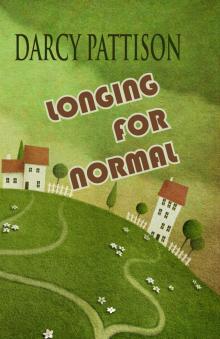- Home
- Darcy Pattison
Longing for Normal Page 8
Longing for Normal Read online
Page 8
Miss Brodie-Rock repeated slowly, “I’d like to observe you and Alli working together. Perhaps this would be a good time for you to teach her to use the washer and dryer.”
“Oh.” Still, Mr. Porter sat. “But—” He narrowed his eyes at me.
“Now, please?”
“Oh. Now?”
Miss Brodie-Rock was already clacking toward the laundry room. She stopped in the doorway. “Coming?”
Finally, Mr. Porter stood, leaving the newspaper open on the table.
Passing me, he glared. Words weren’t needed. I had used Miss Brodie-Rock to get something I wanted, and he did not like it.
But a few minutes later, my school uniforms, all my socks and all but the underwear I had on were sloshing around in soap and water. I had food and now, clean clothes. Finally. Social workers were good for something.
I almost grinned. I was getting Mr. Porter into shape pretty fast.
When she left a few minutes later, Miss Brodie-Rock shook Mr. Porter’s hand, “You’re doing everything right, Mr. Porter. Just keep it up.”
“Thank you,” he said solemnly.
We stood on the front step and watched her drive away. Then Mr. Porter said in a calm, low voice, “Don’t use Miss Brodie-Rock against me again. Tim always tried to get my sister and I to disagree, too, so I know the tricks you kids use. This is the only time you use that machine. Next time, you can hand wash. Go on up to your room till supper.”
My face burned with embarrassment, my jaws clenched. Any reasonable person would have already taught me to use the washing machine. I just wanted clean clothes. But I had made things worse.
ELIOT
About noon on Saturday, I suddenly started itching.
Alli had reminded me that a person’s hand has 1500 bacteria on every square centimeter of skin. Every time I scratched, I saw my hand as a miniature metropolis for millions of bacteria. Between my fingers was a small town, just right for a couple hundred-thousand bacteria, probably all from the same family. My hairy arms were flat, fertile fields full of bacteria, fields ready for harvest.
I tried to laugh at myself. Really, I had not itched like this for three years. I tried to tell myself that there was nothing, no germs. Instead, I itched; I scratched; I worried.
It took me back to those days in first grade when worrying about germs could send me into a panic attack. Dr. Spray had taught me techniques to avoid the attack. Gee, I hadn’t thought of them for over two years. And that made me worry even more. A year without meds. I didn’t want to go back.
That afternoon, I worked on the website about Griff. I downloaded pictures that people had sent, cleaned them up in Photoshop, and uploaded them to the right pages. They were mostly black and whites, but some pictures were badly faded color photos and those were hard to fix. Computer work always helped me forget about myself. I concentrated on the tiny details of making a web page, trying to position everything exactly right.
But eventually, my stomach demanded food. I went to the kitchen and fixed a peanut butter and jelly sandwich—on sourdough, of course. With the first bite, the itching started again. I stopped and washed my hands, getting rid of the germs, I was sure. All 1500 bacteria for every square centimeter.
I ate half the sandwich, nibbling off the crust first, then nibbling away at the middle. By then, I could barely hold the sandwich without twitching. Disgusted with myself, I set the sandwich on a paper towel and washed my hands again.
This time, I carried my sandwich back upstairs to my computer, as far away from the sink as I could. Passing Marj’s office door, she leaned away from her computer and watched me, but said nothing.
I wish she had stopped me to talk, but what did we have to talk about?
Upstairs, I quickly finished the sandwich, forcing myself to take big bites.
I needed distractions. I called Toby and invited him to bake bread the next day. And I kept him on the line talking about his PeeWee football practice that morning.
When Toby finally hung up, I debated about calling Alli. The thing is, yesterday, when given a choice, Alli took a regular Band-Aid. Miss Clay had laid out neon-colored, camo, cutesy Barbie or GI-Joe, or just the plain skin-colored bandages. Why did she still do that for sixth graders? Alli took a skin-colored one. And she didn’t want a huge one, but one just the right size. The other girls in our class hadn’t outgrown the habit of choosing strange ones. Marissa Blue always wanted the neon colors; Patsy Rupert went for the cutesy things; and Julie Apple, well, she got the biggest, loudest Band-Aid offered. Such babies.
Maybe Alli would be okay to work with on the Bread Project, not flashy or giggly or silly like the other girls. I could try her out by inviting her to the house with Toby. If she was okay here, she might work out. I took a big breath and dialed the Porters. When Alli said, “Yes,” I said, “Thanks, bye.”
I was calm enough to go the kitchen and pull out the sourdough starter and mix up some dough. I concentrated on the dough, on measuring the flour, on stirring the thick dough with a spoon, trying not to get sidetracked. Trying not to think of germs and soap.
I set the dough bowl into the oven to proof. By tomorrow morning, it would be double in size and ready to make bread with Toby and Alli. Then I fed the remaining starter and put it back in the refrigerator.
Marj wandered into the kitchen, rummaging the shelves in search of pretzels, coming up with some cheese crackers. She was scratching her arm, too.
Dr. Spray had even explained why people around me might be scratching, too. It was “sympathetic itching.” Marj was scratching because I was scratching. Probably didn’t even know she was doing it.
Finally, I tried Dr. Spray’s most effective technique: I tried to make the itching feel even worse. Griff had explained: He said I had to believe it was in my head before the relaxation thing would work.
“My stomach itches,” I told myself.
Well, yes. It did.
“My back itches,” I told myself.
It did. Everywhere itched! Despair settled in, and I sat on a kitchen stool and slumped over, laying my itchy face on the cool cabinet top.
Marj set down her glass of Coke and squinted at my neck. “Let me see.” She pulled up the back of my T-shirt. “You’ve got a rash.”
“Rash?” I didn’t understand.
“You’re all broken out.”
“I am?”
“Don’t sound so happy about it,” Marj said. She opened the kitchen cabinet where medicines were kept and pulled out the Benadryl. “Maybe you’re allergic to something in the yard, doing all that work this morning.”
Relief flooded through me. It wasn’t the anxiety coming back; it was only a rash. I wasn’t going crazy. “I have a rash.” I smiled at Marj, then swallowed the pill she handed me and drank a glass of water.
I had gotten up early that morning, so I was already tired. The Benadryl put me to sleep so soundly that I didn’t wake until the middle of Sunday morning, when Marj shook me awake.
“Look.” She thrust her hand in my face.
“What?” I shoved into a sitting position and squinted, trying to focus. Marj’s hand had clear blisters on two fingers. “What?” I repeated.
“Poison ivy.”
“No way!”
“That vine, the one you put in the flower vase? Poison ivy. I didn’t pay attention until I threw it out this morning.”
I collapsed backwards and pulled the pillow over my face. All that yard work. And now, things would be even worse. Marj was never a good patient, one of her few faults Griff used to tease.
“It’s okay, Eliot.” Marj had a grudging tone. “It was an accident.”
I peeked out. She looked tired, like a deflated tire. “I’m sorry,” I whispered.
“It’s okay.” She studied her other hand, then held it up to show me a blister on it, too. “We won’t go to church today. I’m going to the pharmacy.”
After she left, I hugged the pillow to my stomach and realized that I wanted to scratc
h my arms, my legs, my back, my face–everywhere. I just stared at the ceiling, trying not to itch, trying not to cry, trying not to think of how stupid I had been to bring her poison ivy.
Trying not to think. 1500 bacteria. Every square centimeter.
ALLI
Tall oaks, white two-story house, green roof, big porch, green front door–I loved Eliot’s house on sight. I wiped my sweaty hands on my shorts, and then pushed the doorbell. Eliot sounded nervous yesterday when he called. Like he wasn’t sure he wanted to invite me over. I’d have to make sure I did everything right. I needed him as my backup for the Porters. Inside, the chimes rang. Everything was so traditional, so homey.
Eliot led me into a large kitchen that was open to a living room beyond. Toby was wearing a sloppy T-shirt, worn-out shorts and flip-flops. Pouring himself a glass of milk, making himself at home. I was so glad I had washed clothes that morning and had changed into clean shorts and a T-shirt.
Mrs. Winston was in the living room on a leather couch, reading. I knew my etiquette, thanks to Mandy. I went straight to Mrs. Winston and held out a hand to shake. “Thank you, for letting me come over.”
She looked up from her book, and I stopped, startled. Her face reminded me of Miss Brodie-Rock’s tennis ball cheeks, it was that swollen. She held up her hands and shrugged at me.
If her face was bad, her hands were worse, with blisters and pukey-pink medicine. I jerked my hand away and hid it behind my back.
“You’re welcome. But I can’t shake. Eliot and I both got into some poison ivy yesterday.” She nodded curtly. “Just make yourself at home.”
“Thank you,” I repeated. And wondered how they got into poison ivy: leaves of three, leave them be. It was easy to spot. Bet Eliot got in trouble for that one.
In the kitchen, Eliot had a blue bowl set out. He held up his hands and said, “It has to be kneaded one more time. But I can’t do it.”
He had disgusting hands, too. On him, the pukey-pink poison ivy lotion had dried up, making everything blotchy. Eliot wasn’t touching anything in the kitchen today. ‘Cause if he did? I wouldn’t eat.
Toby grinned at me. “Do you know how to knead?”
“Nope.”
Eliot used air-motions to show us how to fold over the dough and push it away. “You just keep doing that. Okay, who wants to start?”
Well, I wanted to make friends and that meant I should try it first. Eliot made me wash my hands before starting. But when I finished, he said, “Wash them again.”
I washed again, except this time, Eliot handed me a small nail brush and watched me scrub. To keep from saying something I shouldn’t, I sucked in my cheeks until I dried my hands.
Finally, he scooped out a cup of flour and sprinkled it onto the kitchen counter. Good thing the cup had a long handle, so he didn’t have to touch any flour. Or I wouldn’t have been able to stay quiet.
Toby helped me scrape out the dough, and finally, I was ready to knead: my floury hands hung over the lump of dough. Then I asked the wrong question: “How long do I have to knead it?”
Eliot had a streak of flour across his left cheek. Before he spoke, he looked away. “Not long, ten, maybe fifteen minutes. Long enough for the dough to get elastic.”
I studied his face, the hair falling over his eyes. He couldn’t look straight at me, so something was wrong. “Yeah, right. How long?”
“Maybe a bit longer.”
“Like thirty minutes?”
“Maybe.”
Suddenly, I didn’t care if he got mad. “That’s it.” I brushed flour off my hands and washed them for the third time. “I’m not doing this. I’ll get stuck doing it every time, without any help.”
Eliot stared at me, and then lifted his hands. “Well, I can’t do it.”
“I don’t care, I’ll do it,” Toby said. He even sounded cheerful about it. He picked up Marj’s apron, a red one with a teddy bear on it, and tied it on. “I like making pottery; I bet I’ll like this.”
So, Eliot and I sat on stools and watched Toby play with the bread dough. He was football-strong. Even his fingers were strong: punching, kneading, shaping. Adding flour when the dough got sticky, even without Eliot telling him. He fell into a hypnotic rhythm, pulling and folding the dough over, then pushing it away from him, making a quarter-turn, then repeating. I don’t know where he learned that quarter-turn trick. But it worked.
I was glad I had refused to do it. Toby was a natural.
My stomach growled, but softly. Mr. Porter had slept late that morning and so had I. When he heard I was coming to see Eliot, he called a friend and invited him for lunch and golf. Should have made a sandwich: there was still some American cheese in the fridge. But I didn’t want anything then. Now, smelling the dough, I was hungry.
I hopped down to butter the loaf pans that Eliot had set out. “How long before we eat this bread?”
“It has to rise a while, then bake for an hour.”
“Oh.” I sucked in my cheeks, angry at myself for not eating earlier.
Eliot noticed my distress. “Marj,” he called, “may I open the chips and salsa?”
“Well–” Mrs. Winston sat forward where we could see her better, grimacing at even this small movement, and started to scratch at her hands. She looked down, stopped the scratching and frowned. “It was for supper tomorrow.”
“I’ll pick up some more on the way home from school,” Eliot said. But he patted his back pocket and frowned.
Mrs. Winston shrugged and sank back on the couch. “Okay. Sure. But leave the pretzels for me, please.”
The phone rang. Neither Mrs. Winston nor Eliot wanted to answer it, and Toby’s hands were full.
Mrs. Winston leaned forward again and called, “Get that, please.”
I looked around and found the phone on the corner of the cabinet. It was a cordless phone, black. I grabbed the hand receiver from the base unit. “Hello?” I said.
It was Mrs. Lopez, wanting to talk about the Bread Project, so I carried the phone in to Mrs. Winston. But she had me explain about her hands and promised to call Mrs. Lopez tomorrow. Back in the kitchen, I set the receiver back in its base. And I thought of Miss Brodie-Rock that morning, tapping her clipboard and pointing at the Porter’s phone. Mr. Porter’s phone number was blocked from calling the Paynes.
But this one wasn’t.
“Is this about ready?” Holding the dough in both hands, Toby pulled the dough up, letting it droop in the middle. It was smooth and shiny. When Eliot agreed it was ready, Toby shaped it and set the loaves in the buttered pans. Finally, we set the bread pans on top of the stove to rise.
In the breakfast room off the side of the kitchen, Eliot sat out chips, salsa and glasses of water. And the deck of cards held together with gauze.
I should have been thinking about the bread and about playing cards and worrying about catching Eliot at cheating. But my mind was on the phone. And about Mandy and her baby. And about Ted not letting me talk to Mandy. But he often went out with golf buddies on Sunday afternoons.
We wolfed down chips and salsa until the chips were almost gone and my stomach felt better.
Toby picked up the cards and said, “What do you want to play?”
“Rummy,” Eliot and I said in unison.
And I smiled, knowing it was going to be a fun afternoon. But first–“Excuse me for a minute. Where’s the bathroom?”
Eliot told me how to find the half bath near the door to the garage. As I went through the kitchen, I grabbed the portable phone.
In the bathroom, heart thumping, I locked the door and stood with my back against it, hugging the phone to my chest. Was I going to risk it?
Yes. Ted was gone almost every Sunday afternoon.
I held out the phone and punched in the familiar number. It rang. Once. Twice. A third time. Fourth ring–a soft voice answered, one I didn’t recognize, “Hello.”
“Is Mandy there?”
“Who’s calling?”
“A friend. Mel
anie,” I lied. “I just heard she had an accidental fall and wanted to know how her baby is doing.”
“Oh, that’s sweet. This is her mother, Mimi Holt. She spent two days in the hospital, and they say the baby is fine, but I’m going to be here until the baby comes. They still want her to stay in bed, but she’s fine.”
“Oh, good. I just wanted an update.”
“Oh, for updates. Ted is starting a blog about the baby,” Mimi said. “It’s BabyPayne.com. Neat, huh? Oh, but still call, Mandy will want to talk to you.”
“Hello.” It was Ted’s voice.
I clicked the phone off and slid down the door until I was sitting on the floor. My heart was thumping in my ears. Finally, I knew something solid. Mimi, Mandy’s mother, lived in Houston, Texas and hadn’t come up often. But she had been there a couple times for Christmas, and I knew she wouldn’t lie to me. The baby was okay, really okay.
But Ted had picked up the other portable phone. Had he suspected it was me? Would he block Eliot’s number, too?
Eliot! And Toby!
I stood up from the bathroom floor and unlocked the door. I wouldn’t worry about Ted tracing this number or blocking it until it happened. Because now, I decided, I would read the blog every week and find out when the baby was born, and I would go to the hospital to see it, like we did for Mandy’s friend, Melanie. I wouldn’t bother Mandy or Ted or Mimi, just look in the nursery window at the baby. I wanted to be sure the baby was perfect, just like Mandy wanted.
Meanwhile, there was a card game I wanted to win.
What I didn’t expect was that we would play for real money. That Eliot, he was clever. He didn’t have enough money to share, so he was doing the next best thing: sharing his method of getting money. Sure, I had to agree to help Toby mow grass if I lost, but that was nothing.
By the time the bread came out of the oven three hours later, Eliot and I each had ten dollars, and Toby’s billfold was thinner. But not empty. Playing cards with Toby might not give me an allowance every week. But it helped today.
And today? Eliot had bread to share.
That bread. Before this week, I had never heard of sourdough. For sure, never eaten it. Never had fresh-baked bread, straight from the oven. Eliot cut the largest piece for Toby. Buttered it for him, too. Served him first. After all, Toby had lost twenty dollars. You might even say that was a twenty-dollar piece of bread.

 When Kittens Go Viral
When Kittens Go Viral The Wayfinder
The Wayfinder Sirens
Sirens The Girl, the Gypsy & the Gargoyle
The Girl, the Gypsy & the Gargoyle Saucy and Bubba
Saucy and Bubba Longing for Normal
Longing for Normal Kell, the Alien
Kell, the Alien Sleepers
Sleepers Vagabonds
Vagabonds Sleepers (The Blue Planets World series Book 1)
Sleepers (The Blue Planets World series Book 1) Pilgrims (The Blue Planets World series Book 3)
Pilgrims (The Blue Planets World series Book 3) Pilgrims
Pilgrims Kell and the Horse Apple Parade
Kell and the Horse Apple Parade Sirens (The Blue Planets World series Book 2)
Sirens (The Blue Planets World series Book 2)